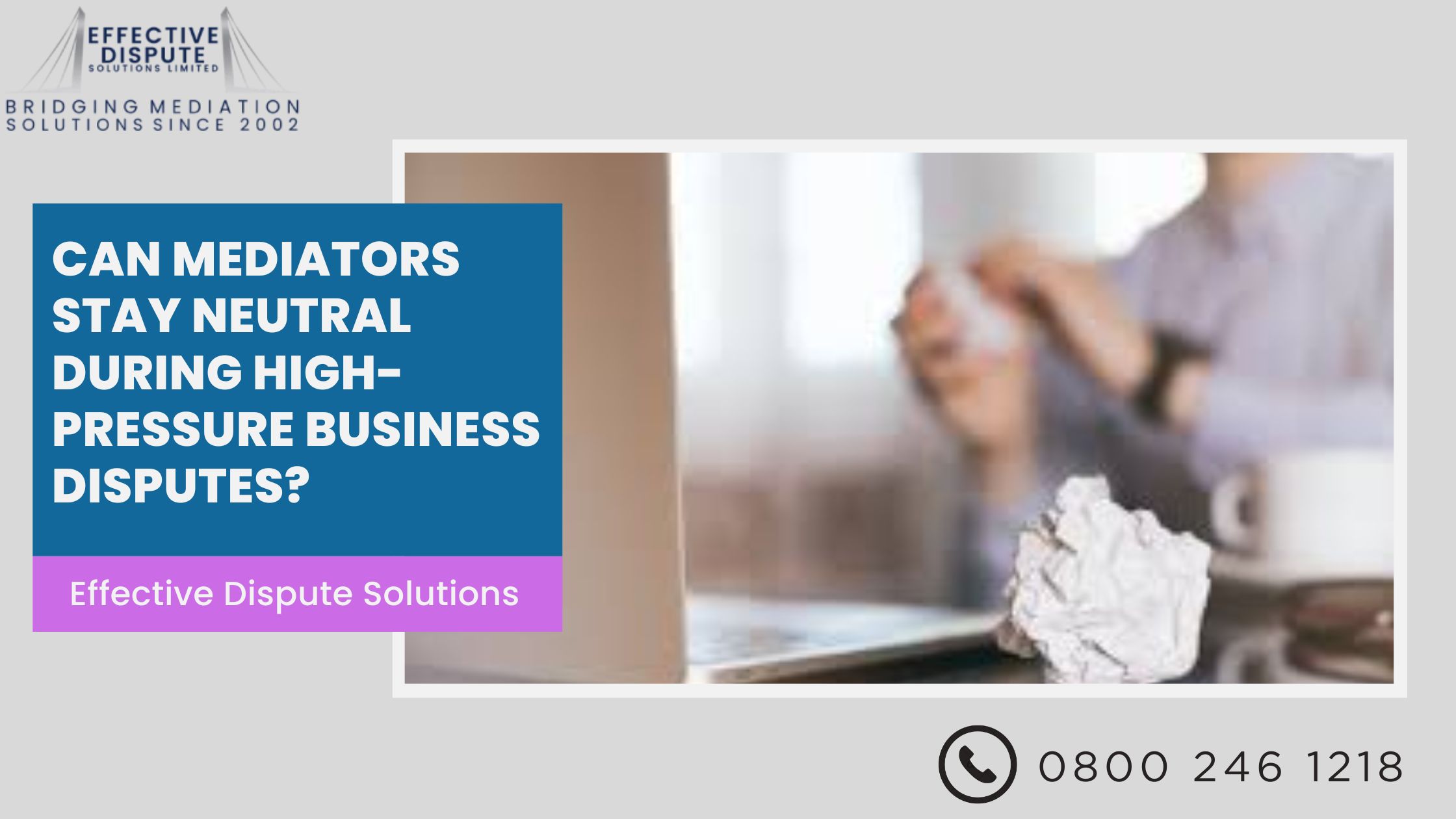In a mediation setting, neutrality is a cornerstone of effective conflict resolution. It maintains a place where both parties can express their emotions and concerns without fear of bias or judgment. In resolving the issue, mediators play a crucial role in finding a solution that works for everyone.
Their job is not to take sides; they have to help both parties to find common ground without adding to the conflict. Moreover, a skilled mediator focuses only on the issues, not personal opinions, and creates a safe space where open discussion can happen.
So, in this blog, we examine how neutrality affects mediation outcomes and explore strategies for maintaining impartiality throughout the conflict resolution process.
What is a Neutral Mediator?
A neutral mediator is someone who does not favour either side. They don’t judge who is right or wrong. Instead, they focus on helping both sides reach an acceptable solution. How a mediator portrays neutrality:
- Listens equally to both parties.
- Avoids making personal opinions part of the discussion.
- Ensures both voices are heard without bias.
- Encourages respectful communication between you and the other party.
Does a Mediator Need to Be Neutral?
Yes, neutrality is essential. Without it, you wouldn’t trust the process, and neither would the other party. Imagine going into a dispute where the mediator clearly takes the side of your opponent. Would you feel comfortable sharing your views? Probably not. That’s why neutrality is not just recommended, it’s required for mediation to work.
Why Is It Important to Remain Neutral as a Mediator in Conflict Resolution?
Neutrality ensures fairness. If the mediator is biased, the process becomes unbalanced, and one side feels disadvantaged. Here’s why neutrality is so important in conflict resolution:
- Builds trust – Both you and the other party can open up honestly.
- Keeps the process fair – Everyone gets the same chance to speak.
- Prevents escalation – When both sides feel respected, tensions reduce.
- Allows creative solutions – Instead of one-sided outcomes, mediators help create win-win results.
Should the Mediator in a Dispute Remain Neutral and Not Take Sides?
Yes, absolutely. A mediator’s role is not to decide who is right but to help you both move forward. By not taking sides, the mediator makes it easier for you and the other party to focus on solving the issue instead of fighting about the past.
5 Challenges Mediators Face in Staying Neutral
Staying neutral is a simple proposition, but the whole reality of business complications sometimes becomes the toughest part of a mediator’s job. High pressure, emotional conflicts, and true power struggles can sometimes test the mediator’s neutrality. Let’s look at five common challenges they face and see how these situations make neutrality hard.
Strong Emotions From Both Sides:
Businesses undergo disputes, and the various emotions-confusion, anger, frustration, disappointment- builds up in the separate rooms. High intensity of emotions could mean that a certain party might want to drag the mediator to their side for support. The trick has been to maintain the empathy level without looking biased, so both parties can calm down and feel respected.
Power Imbalances:
Sometimes, it is just a matter of one party having more money and influence, or legal know-how, than the other. This in itself could place pressure on the mediator to unconsciously favour the stronger side. The mediator’s real task is to ensure that both parties feel they have been heard equally and that there is no discrimination on grounds of power.
Complex Business Issues:
Business disputes usually involve contracts, finances, and other technical matters and tend to become overwhelming. If a mediator grasps one side of the argument better than the other, he or she may unconsciously side with that argument. It, therefore, remains unfair to judge who happens to come up with the best technical explanation; neutrality needs to focus on the fairness of the process.
Pressure for Quick Results:
Businesses want something fast to save time and money. This pressure may encourage a mediator to lean towards pushing one side harder to accept a deal. Balancing between efficiency and fairness becomes the challenge of ensuring that an outcome is not rushed at the expense of neutrality.
Personal Biasedness:
Being human, mediators have values, experiences, and opinions. When an issue hits too close to home, neutrality becomes challenging to maintain. The skilled mediator must constantly self-examine and focus on fairness instead of letting subconscious biases dictate choices.
How Do Mediators Maintain Neutrality?
You may wonder how mediators manage to stay neutral under pressure. Here are some of the ways:
- Setting ground rules – Mediators make sure both sides agree on respectful communication.
- Active listening – They listen carefully to both sides without interrupting or judging.
- Reframing statements – Instead of letting angry words escalate, they restate them in neutral language.
- Balancing power – If one side seems stronger, mediators make sure the other still has a fair voice.
- Staying professional – They focus on the process, not personal feelings.
Why Businesses Prefer Mediation Over Court
If you’re facing business disputes, mediation can save you time, money, and stress. Here’s why many businesses choose mediation:
- Faster results: Disputes can be resolved within a day instead of years in court.
- Lower costs: Mediation is far less expensive than lengthy legal battles.
- Privacy: Unlike court cases, mediation sessions are confidential.
- Better relationships: Mediation focuses on cooperation, so you and the other party can continue working together afterward.
Final Thoughts
Neutrality is the backbone of mediation. While mediators face challenges like strong emotions, power imbalances, and pressure to deliver quick results, their ability to remain impartial is what makes conflict resolution successful. If you are dealing with tough business disputes, working with professionals who understand the importance of neutrality can make all the difference.
At Effective Dispute Solutions, you get access to experienced mediators who know how to stay fair, calm, and neutral, even in high-pressure situations. Our focus is on guiding you toward a resolution that saves time, reduces stress, and helps preserve valuable business relationships. Speak to an expert mediator now!


